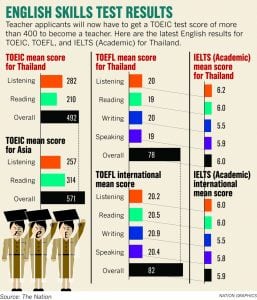STUDENTS’ quality will never exceed the quality of teachers, so experts say. If so, what will Thailand do if so many teacher applicants protest about English-test requirements?
Hundreds of soon-to-be educators cry “no, no” to the Office of Higher Education Commission (Ohec) requirement that candidates to “Teachers for Their Hometowns” score at least 400 out of 990 of the Test of English for International Communication (TOEIC), one of the standardised English tests.
According to Ohec, if candidates do not want to take TOEIC, they can take TOEFL or IELTS or any other widely recognised English-competency tests.
The minimum scores for the qualified candidates will be around the same benchmark. For example, TOEFL scores should not be lower than 40.
Although this requirement is not even half of the total score, people who look set to become teachers have complained that such scores are “Too high to achieve”.
The “Teachers for Their Hometowns” project seeks to recruit final-year education students to fill in at local schools in their hometown.
Candidates in this project have planned to urge Ohec to lower minimum TOEIC scores to just 250.
On a Facebook page, candidates of the project have lamented how they have taken the TOEIC tests many times but still failed to achieve the minimum scores.
This has caused them trouble, given that the test fees are relatively expensive and they must sit the exam in Bangkok.
The most popular comments among the candidates is that: “You already require us to have GPA of at least 3.00 and pass the program’s exams. That should be enough proofs already” and “Please replace this TOEIC requirement with mere English training”.
Sympathy is not what they gain, however. On social media, several Netizens’ comments show they feel these teacher hopefuls are pathetic. Many ask why these candidates do not strive harder to achieve better scores.
“This isn’t how educators should be at all,” one comment said. “If their students use the same logic, they will demand them to deduct grading standards in classrooms as well”.
“Even high school students can make it more than 400, meaning that they may outclass even their own teachers,” another comment said.
OHEC Secretary General Supat Jampathong told The Nation that the requirement will remain the same. “This test is meant to select capable teachers into the educational system,” Supat said.
“So it’s common that the test is made harder each year. English is also made compulsory by the Education Ministry.”
–

–
Ajaree Chamroonkitkajhon, a waiting-list candidate to the program, admitted that to get 400 for TOEIC is really difficult for her.
Living in the deep-south Narathiwat, Ajaree needs to travel to the capital to sit the exam. Another trip will be needed as Ajaree has yet to achieve the scores.
She doesn’t expect Ohec to adjust the standard. “My field is kindergarten teaching, I think that English is really necessary as a teacher to at least communicate” she said. “It’s my own challenge to pass it to become a decent teacher.”
While it should be compulsory for teachers to have English proficiency, the system can facilitate them to achieve it, suggested Attapol Anunthavorasakul, an education lecturer from Chulalongkorn University.
From managing English courses in local education centres to making an English-friendly environment on campuses, authorities can arrange to encourage teachers and education students to use English, Attapol said.
“Most of all, learners have to engage themselves with English,” he said. “Classroom-based English may be sufficient to take exams but not enough to mobilise them in the real world.”










































